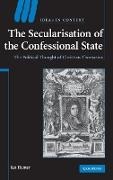Read more
Informationen zum Autor Ian Hunter is a children's author who lives on the south coast of England, UK, with his partner and their two cheeky cats (aka writing mascots). He loves anything creative and can usually be found writing, planning an adventure holiday, or escaping to a fantasy world. Ian's debut novel, 'Fyn Carter and the Agents of Eromlos', was shortlisted in the Children's category for a Selfies Book Award 2025. He has many more stories to tell and is excited to share them with children and young-hearted adults like him everywhere. Klappentext Christian Thomasius (1655–1728) was a tireless campaigner against the political enforcement of religion in the early modern confessional state. In a whole series of combative disputations - against heresy and witchraft prosecutions! and in favour of religious toleration - Thomasius battled to lay the intellectual groundwork for the separation of church and state and the juridical basis for pluralistic societies. In this first book-length study in English of Thomasius’ political thought! Ian Hunter departs from the usual view of Thomasius as a natural law moral philosopher. In addition to investigating his anti-scholastic cultural politics! Hunter discusses Thomasius’ work in public and church law! particularly his disputations arguing for the toleration of heretics! providing a revealing comparison with Locke’s arguments on the same topic. If Locke sought to base toleration in the subjective rights protecting Christian citizens against an intolerant state! Thomasius grounded it in the state’s duty to impose toleration as an obligation on intolerant citizens. Zusammenfassung Christian Thomasius (1655–1728) was a tireless campaigner against the political enforcement of religion in the early modern confessional state. In this study of Thomasius' political thought, Ian Hunter discusses Thomasius's work in public and church law, providing a revealing comparison with the arguments of John Locke. Inhaltsverzeichnis Introduction; 1. Religion, politics, and the university; 2. The reform of philosophy; 3. Natural law as political psychology; 4. Staatskirchenrecht: the religious rights of the prince; 5. The toleration of heretics; Appendix. The right of Protestant princes regarding heretics....

